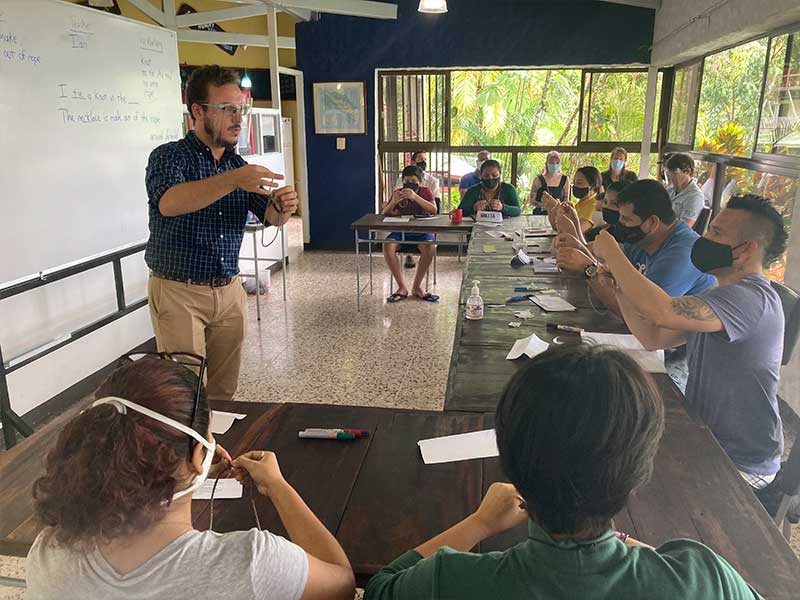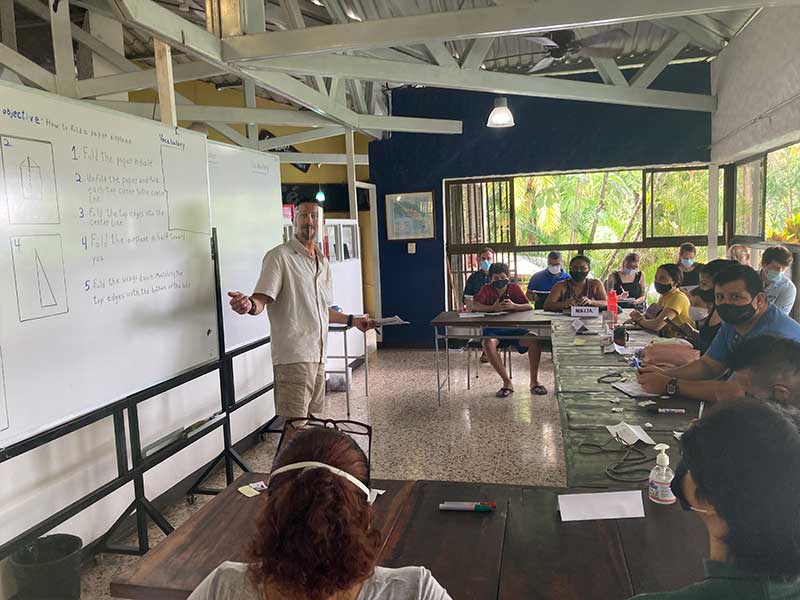You’ve been convinced. You’re getting TEFL certified so you can find a teaching job and start your life abroad. All that’s standing between you and that new life is passing your TEFL Certification Course. Regardless of which TEFL program you choose, you will be consuming a lot of information in a short period of time. So while you’re busy wondering if you really are fluent in English after all, here are some study tips to get you through your training program.

Create a Study Space
Your mindset is shaped by the environment you create. If you’re someone who regularly writes papers from bed or conducts virtual interviews without pants, you might want to rethink your study habits. Learning is not impossible from the comfort of your bed; it is just more challenging to remain focused and disciplined from your Netflix home theater. If you put on normal clothes and choose a particular learning spot, your mindset will change to work mode. Your set-up doesn’t need to be elaborate, just a designated workspace. It could be anything from a full-blown home office to that corner of your room with the backrest.
When you put yourself in a working space, you’re prone to be less distracted and more productive. Studying and completing your coursework will become more efficient and probably take up less of your day. If you have chosen an onsite TEFL program and plan to be studying from a homestay, you will obviously have less control over your environment. But you can still help yourself focus in little ways. Headphones are very helpful for concentration. You could also accomplish a lot of your studying at your training site if you’d rather leave work at work. Or you could even find a favorite spot in town to study. I would avoid karaoke bars and clubs as tenable study environments. But a local coffee shop could be perfect if white noise isn’t too distracting for you.
Budget Your Time
Prioritize which tasks need to be completed first and maybe even mark them on your calendar. Breaking your to-do list into smaller items with different due dates can make the process less overwhelming. And once you have a better picture of what you’ll need to accomplish day to day, leave yourself ample time! There’s nothing worse than spending a whole day of scrolling through cat memes only to realize at 3 in the morning that your grammar paper is meant to be single-spaced. Procrastinating is the enemy of productivity. But this doesn’t only apply to assignment deadlines.
A lack of priorities can also cause your coursework to seem infinite. It’s easy to get lost in the myriad of concepts and become frustrated. The English language is a lot to cover in itself, teaching methods aside. To avoid feeling like your TEFL assignments will take you the rest of your life, start with the most important things. For example, prioritize overarching ideas and emphasize the areas in which you know you need more practice.
Organizing your tasks goes hand in hand with organizing your time. To make sure that you’re setting aside adequate amounts of time, schedule study sessions. When you start studying earlier, you are giving your brain more time to process and retain information in your long-term memory. This prevents you from doing six shots of espresso right before the end of your course and temporarily memorizing information that you’ll lose within a few weeks. Looking at the big picture when you receive your syllabus will make you a more successful candidate throughout your TEFL program.

Make Time for Breaks
Part of planning study sessions is ensuring that they don’t take up your whole day. You should include breaks in your routine. If you’re well-rested and taking time to do things you enjoy, your time learning will be spent more productively. But if you don’t plan your breaks just like your study time, it’s too tempting to take one every two minutes. A single google search can easily spiral into a conspiracy theory black hole. And a quick bite might escalate into homemade tapas with the entire bottle of wine. If you set goals for stopping points and schedule breaks, it’s much easier to achieve balance.
And one of the best ways to rest a tired brain is by doing some physical exercise. Make at least one break each day into a little workout. If you’re a runner, have a yoga practice or play basketball, those would be perfect breaks. But it can also be as simple as jumping rope for 10 minutes to get your blood pumping. Countless studies have shown a positive connection between exercise and improved memory. And allowing natural movement into your body will make it easier for you to sit back down and focus later.
Recap
Stop intermittently to review the material you are covering. It is especially helpful to summarize content in your own words. Writing short summaries and taking notes while you study will help you retain more of what you’re learning. Each time you familiarize yourself with a new concept or finish reading a chapter, put the main ideas in your own words. You likely won’t have time to reread your books but your own notes will become an invaluable resource.
Everyone takes notes differently and all that’s really important is that you can decipher your own short-hand during your next study session. But sometimes, mind mapping is a helpful alternative to more traditional or linear note taking styles. It focuses on associations and the connections between topics, which can be very helpful if you’re trying to synthesize what you’ve learned. There are even several free mind mapping websites available if you don’t want to put pen to paper.
UMD (Use Mnemonic Devices)
For the more technical aspects of your training, help your brain out a bit by making your own mnemonics. A mnemonic device is a learning technique that makes material easier to remember via associations. It could be anything that helps you associate the material you need to learn with something easier to memorize— a rhyme, an acronym, a link from your personal life. For example, in a basic spanish class I was taught to remember the stem change in “perder” (to lose) with the mnemonic insult: “Pierre is a little loser.” But if mnemonics sound like just one more thing to remember, flashcards are a great tool to memorize things the old-fashioned way.

Quiz Yourself
You don’t need to wait for your TEFL trainer to test you to see what you should be practicing. Use your own notes and course guidelines to identify your weak areas. If your TEFL course includes a written exam, consider timing your practice to decide if you need to slow down a bit to make less mistakes or focus more on speed. But don’t waste your time worrying about TEFL before you even get there.
A large part of your training will focus on practical classroom experience and personal reflections. So coming to class, being engaged and trying to apply what you’ve learned in your own lesson planning is what’s most important. All of these tips and tricks will certainly help but don’t feel like you won’t be receiving outside support. Máximo’s staff will be happy to answer any questions during office hours and you’ll have a whole class of peers to help you along the way. Your first job is to just show up!
